Day two│ 23 May 2024
The OTT Conference 2024 brought together think tank leaders, funders, and policy experts from across the globe at Fundació Bofill in Barcelona. This year, our central theme revolved around the dynamic relationship between think tanks and their communities. As think tanks evolve, their role as facilitators and collaborators becomes increasingly vital in bridging the gap between research and policy. This article provides a summary of the key ideas discussed during day two of the conference.
Keynote address – Do think tanks need to start rebuilding trust?
Ismael Palacin, Director of Funacio Bofill, Spain
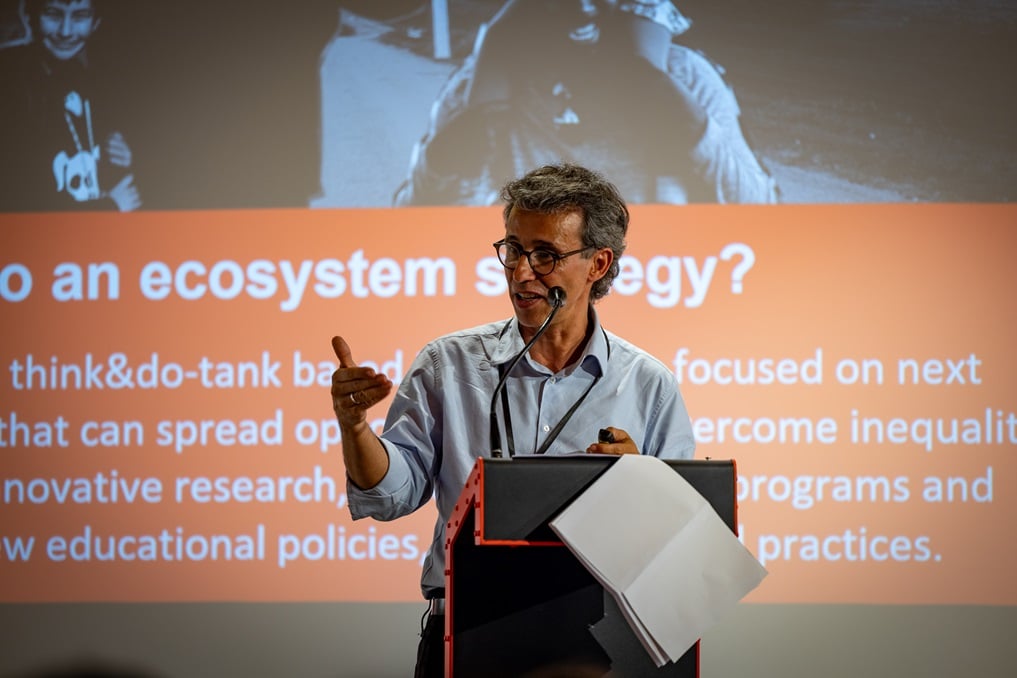
International research tells us that public trust in institutions is declining – and this includes think tanks. Think tanks used to base their legitimacy on robust research. But they can no longer take this legitimacy for granted, argued Ismael.
Legitimacy today may be granted or questioned on any given day depending on the actor and their current context. Trust, therefore, must be (re)built each day. To do this think tanks must get down to the ground and deliver real value to the actors we work for. Ismael argued that think tanks must consider diverse knowledge, promoting solutions that different actors can own and apply.
He presented how Bofill’s theory of change has evolved through different stages and contexts to increase impact over the years.
Key ideas:
- Ecosystems: Understand the ecosystem you are trying to impact: a 360 vision that will support sustainability. Become an ecosystem yourself to maximise impact: Bofill is now becoming an ecosystem within Cataluña. They know the region (local), they know the people, the education budget is a priority, the discussion about education is big at the policy and city level – involve them all.
- Focus: since we will never solve it all, identify the main challenges. Bofill identified four main system challenges to reduce inequalities: learning communities agendas strengths, zero drop out, school of opportunity, and digital equity.
- Build mixed strategies (traditional plus new) for every challenge.
- Management systems should accompany any evolution to ensure you don’t end up acting as an obstacle. It is not easy but it is doable.
Parallel sessions
2024 a year of elections: the role of think tanks?
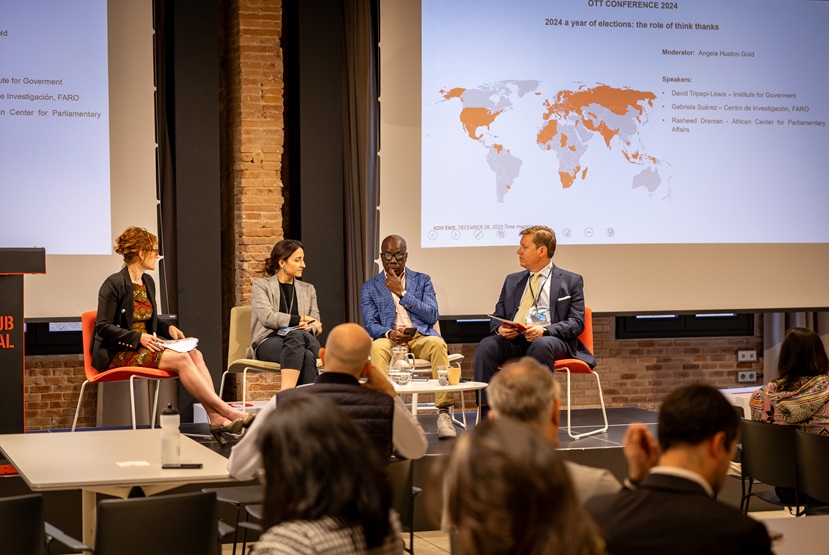
Topic:
This session explores the role of think tanks before, during and after elections. Speakers will share different experiences from around the world. Reflecting on questions like how can think tanks contribute to policy analysis and evidence-informed decision-making in elections? What is the role of think tanks in simplifying complex discussions for different audiences? How can we help to promote informed public engagement during elections? And what future challenges do think tanks face in election processes?
Speakers:
- Angela Huston, Director of Strategy at IRC (Netherlands) (facilitator)
- David Tripepi-Lewis, Director of Partnerships and Development at the Institute for Government (United Kingdom)
- Rasheed Draman, Executive Director of the African Centre for Parliamentary Affairs (Ghana)
- Gabriela Suarez, Executive Director of FARO (Ecuador)
Key ideas discussed:
- Integrity in research and practice within varied political contexts: The speaker discussed how integrity can be maintained in research, even in non-democratic or hybrid regimes. They emphasised the need to understand the power dynamics and specific contexts of these regimes, which can influence the integrity and operational strategies of research organisations and think tanks.
- Balancing normative standards with practical realities: There is a focus on the challenges of maintaining integrity while navigating the demands of both foreign donors and domestic political environments. This includes dealing with varying expectations and standards of integrity, as well as the practical necessity of sometimes compromising to maintain access and influence.
- Market and audience for policy-oriented research: The text highlights the importance of understanding the market for policy-oriented research, including who funds it and who uses it. This ties into the broader question of how think tanks and researchers define and maintain their integrity while addressing the needs and expectations of different stakeholders, including those who may not share the same appreciation for scientific knowledge or normative standards.
Think tanks: new challenges, new models?
Topic:
Reality is changing and to confront the issues of the current world, new think tank schemes or models are required to address these challenges. In other words, to have a role in today’s complex current landscape, think tanks must innovate not only their products or lines of action but also their operating model. This may be especially important in specific regions or thematic areas.
Speakers:
- Oswaldo Molina, Executive Director of Red de Estudios Para el Desarrollo (Peru) (facilitator)
- Aida Aidarkulova, Executive Director of the Central Asian Policy Studies Unlock (Kazakstan)
- Joel Moffat, student and writer for The Security Distillery student think tank (Europe)
Key ideas discussed:
- The most frequent challenges identified by the participants are related to funding and financial sustainability, navigating political turmoil and ensuring the well-being and permanence of their staff (human resources).
- The speakers identified three main challenges related to the domestic and regional contexts in which they operate;
- Aida Aidarkulova from CAPS Unlock (Kazakstan): operating in a hostile environment with surveillance, authoritarian governments and distrust from the public.
- Joel Moffat from The Security Distillery (UK): Low public trust in think tanks due to perceived lack of transparency and close ties with corporations and politicians.
- Oswaldo Molina from REDES (Perú): Misinformation and fake news.
- Think tanks must invest time and resources in adapting to new communication methods (i.e. using Tik Tok & podcasts) to remain relevant and effective, leveraging social media while acknowledging its potential downsides.
Membership for the benefit of all
Topic:
Think tank membership often involves individuals and organisations signing up for exclusive access to content and events in return for a regular payment. But such schemes can do more than simply raising revenue – important as that is – and focus on fostering a more profound exchange between think tanks and the stakeholders (individuals, companies, public entities, research institutes) with whom think tanks operate.
This workshop offered participants the chance to explore the features that characterise different models – and corresponding benefits – of think tank membership and consider what approaches work best in what circumstances while respecting values and working principles.
Facilitators:
- Cormac Bakewell, Partner at Soapbox (United Kingdom)
- Naomi Isaacs, Director of Brand and Strategy at Soapbox (United Kingdom)
Key ideas discussed:
- Membership helps an organisation to generate revenue through membership fees, amplify impact, gain legitimacy and support, gather different perspectives and be more effective at the convening.
- Membership provides visibility to members, the ability to influence policy and research agenda, access to exclusive content and events and learning opportunities.
- Values and principles that are aligned are important for membership to work.
- A think tank should be cautious of the type of narrative they generate. They should create a pre-determined criterion for membership.
“Unconference” – what’s missing from the conversation?
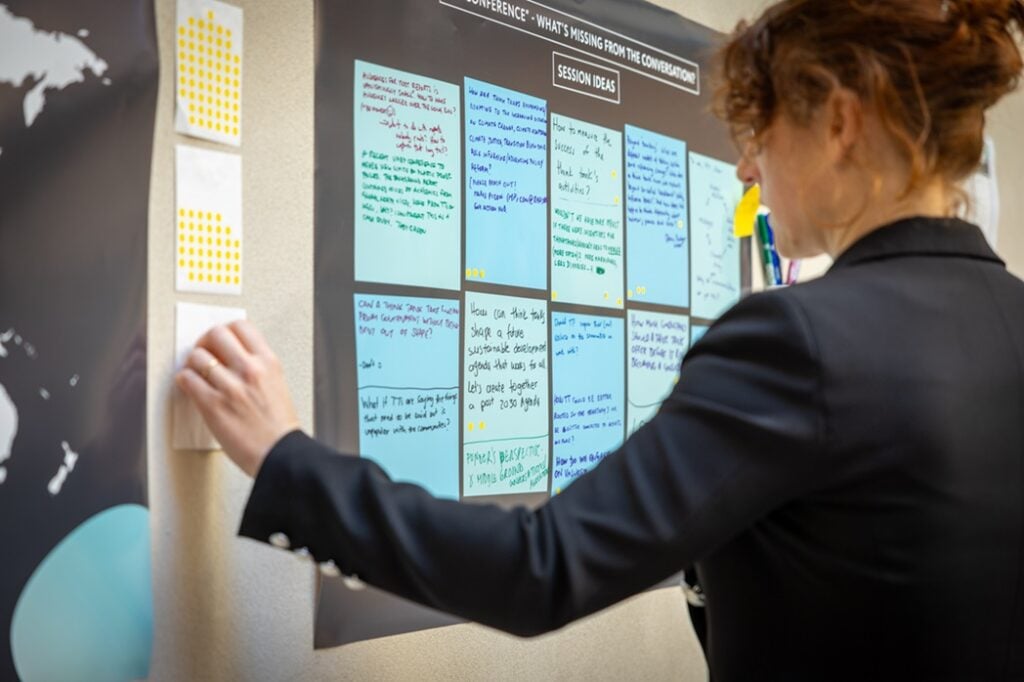
Participants were invited to propose new discussion topics at the conference and vote for their favourite ideas. The chosen topics were:
- What to do with reports that nobody reads?
- Post-2030 agenda: how can think tanks help shape a sustainable development agenda?
- Can a think tank accept funding from a government without being “bent out of shape”?
- How to measure the success of think tank activities?
- How are think tanks adapting to growing discussions on climate change adaptation and justice?
Plenary session: A conversation with think tank funders
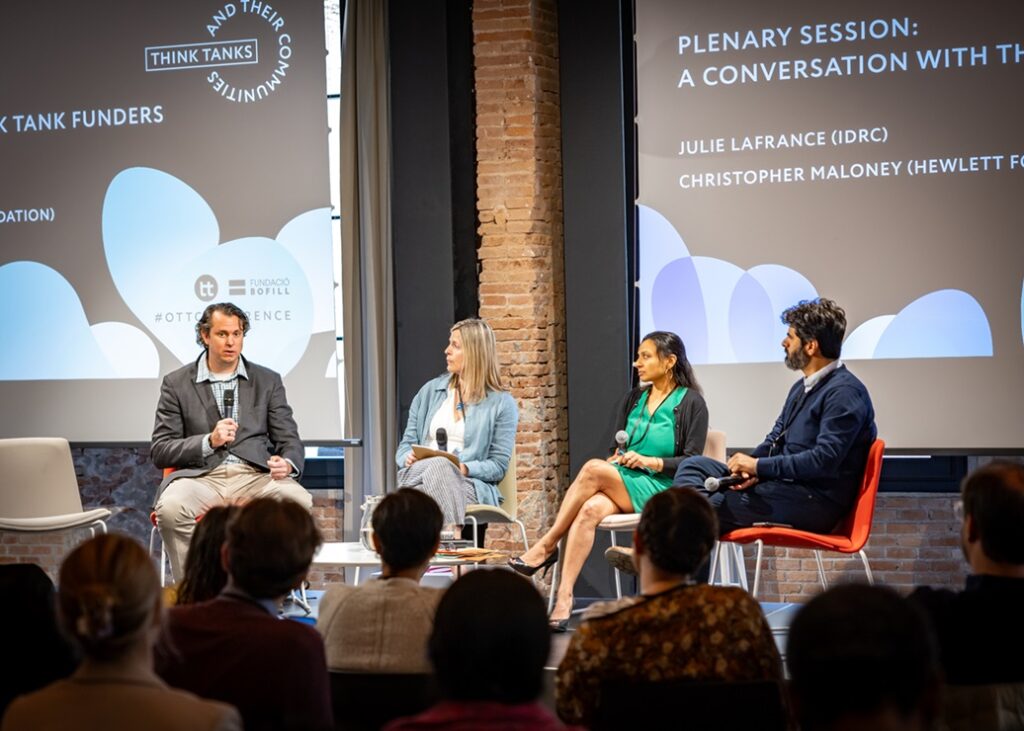
Topic:
Strong think tank-donor partnerships are essential for meaningful impact – but how do we get there? This conversation addressed key questions like how can funding support different ideas and balanced debate? How can funders collaborate to support their think tank partners? How is impact shaped by funding cycles? Share your experiences and reflections to build on the conversation.
Speakers:
- Julie LaFrance (IDRC)
- Christopher Maloney (Hewlett Foundation)
- Rumeli Banik (The Pew Charitable Trusts)
Key ideas discussed:
- There is a noted preference for core funding, particularly highlighted by funders like the Hewlett Foundation, which allows for more flexibility, especially in specific geographies. However, the shift towards core funding is not universally observed, possibly due to historical contexts such as the 2008 financial crisis, limited resources, and varying levels of board flexibility. Making a strong, clear case for core funding is essential for the grantees (grantees should make the case), and the relationship between grantees and funders plays a crucial role in securing it.
- A preference for core funding isn’t seen across the board. What might be the reasons why there are more conversations about core funding than actual core funding? Budget templates – line items. It is worth asking the question. How funders think about assessing performance. Rethinking how funders think about MEL. Before the 2008 financial crisis, there were more opportunities. for core funding because there was more money. You have to make the case to get core funding. The project officer is accountable and it depends on the flexibility of the board (and the foundation). Programme officers/project officers want to talk about the wins. Communicate that with your programme officers so they can talk to their leadership so they can keep investing in this space. The stronger that you can make your case (clear proposals) about the direction that you’re going in. Keep in mind that internally funders are champions of the work, there are still a lot of decisions that need to be made. They have limited resources too. Public funders may have more restrictions on what they can fund. Private funders have more flexibility.
- Effective communication between grantees and programme officers is vital. Grantees need to articulate their successes and project directions clearly to help programme officers advocate for continued investment (MEL). Open, honest conversations enable funders to understand the grantees’ contexts and challenges better, DEI is increasingly important.
- Funders need the grantee to tell them what relationship could look like. Open, honest conversation with funders. Grantees allow funders to better understand the context, projects, etc. Donors are constantly facing with risks and challenges. DEI is important – when they look at how we select our grantees, there are inequities.
- Final thoughts: The world right now is absolutely not what it looked like ten years ago. Windows of opportunity to disrupt things. This policy change – it can’t just be the one funder themselves with their limited funding. The quality of partnerships. Funders want to partner together and co-fund.
Watch session
Keynote address – Think tanks and youth: moulding active and responsible citizens
Elizabeth Sidiropoulous, Chief Executive of the South African Institute of International Affairs (SAIIA)
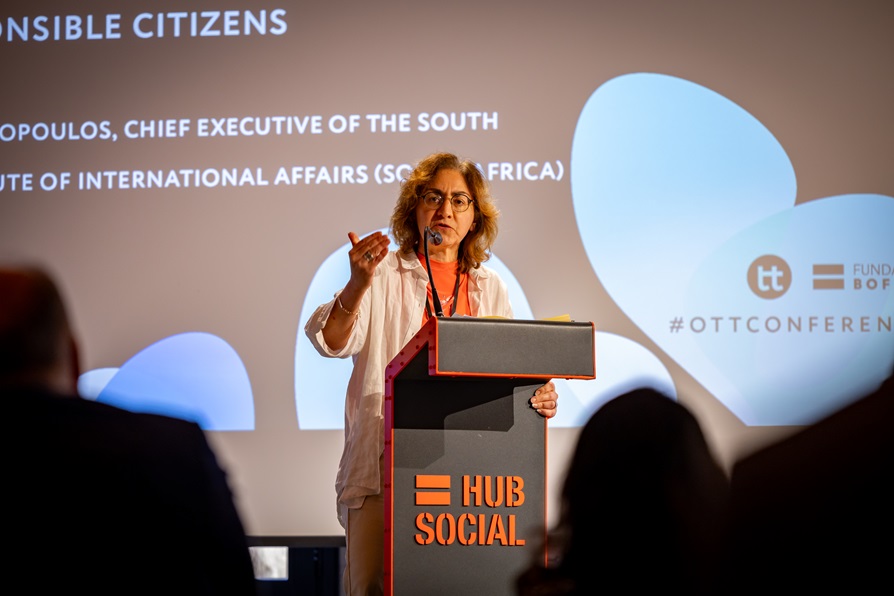
By virtue of their focus on effective policy-making for the future, think tanks have a responsibility to consider young people as an important constituency in shaping their research agenda and as a critical audience for engagement. SAIIA’s youth programmes have pioneered an approach that emphasises co-creation of research priorities, policy engagement and advocacy with young people on issues from sustainability and climate change to gender. Elizabeth Sidiropoulos explored how such initiatives can create a greater connection between think tanks and the communities in which they exist. How can think tanks become vehicles for sensitising policymakers to the importance of inclusive policy-making that is not divorced from constituencies such as youth?
Key ideas:
- Context: youth demographic boom, youngest population lives in Subsharan Africa, 75% of those under 35 will be in Africa in 2040. Large unemployment within young population. Work on cultivating partnerships with schools, universities, govts, funders. Build up a pipeline of activities on skills and also a network of people who have been involved for a long time: seeing them move up from 15 to 25 moving to their professional careers and wanting to remain engaged. SAIIA sees themselves as facilitators for young people to become engaged and make an impact on different discussions at local and national level
- Think more strategically about how to group the various types of engagement: 1. Capacity building and skills development to participate in international relations and policymaking; 2. Policy engagement: they engage directly in actual policy, and the regulation, they have an Alumni network to keep them engaged and become mentors for younger ones and a network of educators who are really committed and do this in their spare time; 3. Policy implementation: how to implement ideas that they placed in action plans, they created the Youth Implementers for change to take policy propositions and proposals and submit a proposal on how they would implement this policy
- Challenges are varied: progress as a network but to become really heard (not tokenistic), economic challenges for participation from young people (from different social backgrounds), divide between urban and rural and apartheid legacy, language barriers (11 languages), how to get materials produced to the communities, and how to deal with young people on different backgrounds and ideologies: how to remain inclusive
Parallel sessions
How does an evidence community strive?
Topic:
This workshop delved into the drivers, challenges and values related to the sustainability of evidence communities. Participants were asked to reflect on their experiences and aspirations related to collaboration, trust-building, cultural sensitivity, and inclusive representation in the evidence field. Participants imagined strategies for future-proofing leadership and promoting diverse voices and proposed actionable insights on how evidence communities can evolve sustainably and equitably over time.
Facilitators:
- Andile Madonsela, Co-director and Gender & Evidence lead of the Pan-African Collective for Evidence (South Africa)
- Laura Boeira, Executive Director of Instituto Veredas (Brazil)
- Laurenz Mahlanza-Langer, Executive Director of the Pan-African Collective for Evidence (South Africa)
- Rumeli Banik, Principal Officer of the Evidence Project at The Pew Charitable Trusts (United States)
- Tanja Kuchenmüller, Unit Head of Evidence to Policy and Impact at the World Health Organization (WHO)
Key ideas discussed:
- Linking between global and national levels: e.g. Evidence-Informed Policy Network (EVIPNET) in Geneva and the Transforming Evidence Network (TEN), linking between countries and global
- Diversity/cross-sectoral element is valuable but also can be a challenge–reaching across different terminologies.
- Duplication of efforts is common and is a reason to host a network–where much of the focus is on avoiding reinventing the wheel.
- Prioritising the time–funding the time to participate in a network is not easy.
- Networks are leadership dependent and there are a lot of hardships associated with renewing leadership. Changing the secretariat of a network is a challenge, but we also want to keep passing the microphone around/sharing voices.
- The most useful networks are often those that arise organically.
- Caution around networks–are they adding value, is it better to start new networks or strengthen existing ones?
- Who drives the network? If the secretariat stops, would the members still collaborate?
- Renewing the network–turnover of leadership, both through spin-off/new affiliated groups (e.g. AEYL) and co-chairs (e.g. AEN has a co-chair).
- Diversity and inclusion in networks–language, who is speaking? But in the context of scarce resources–a homogenous network is easier/cheaper.
- Resources: more resources, more credibility. Less resources, less credibility!
- Participation takes resources. So, fund people to come, and provide mentors.
Are we facing a leadership crisis?
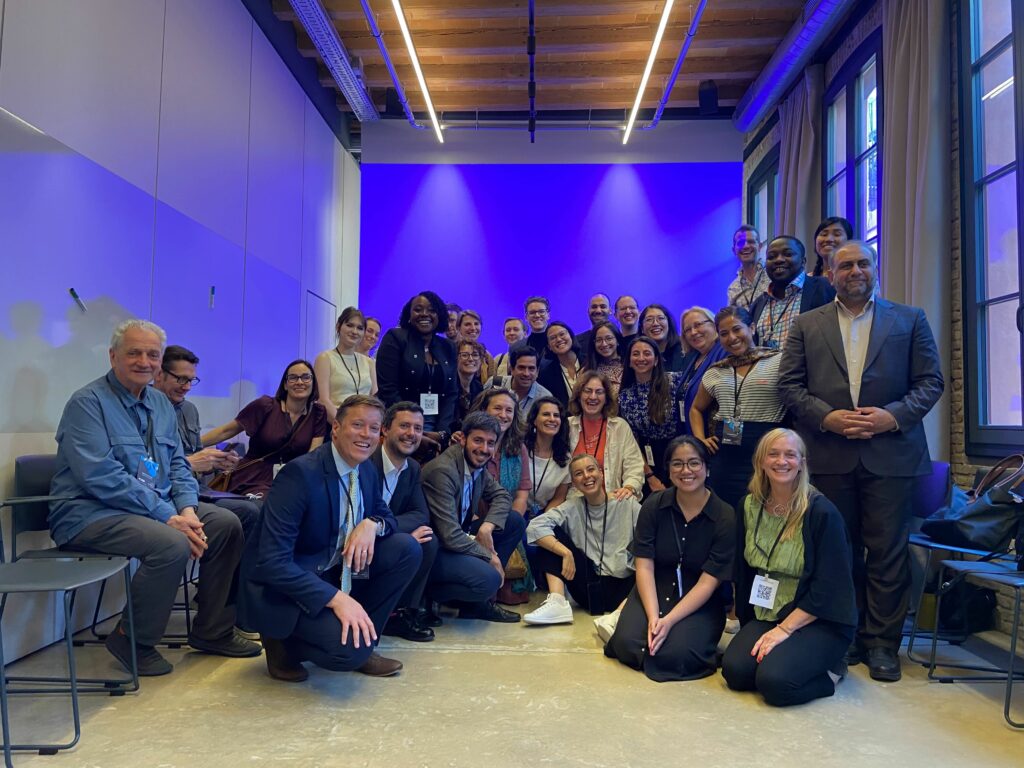
Topic:
According to Ipsos research, we’ve entred an era of polycrises. At the same time, scholars argue that we’re facing a severe leadership crisis. Current leadership models are not only ineffective, but they are also failing us. Why and how have leadership models failed us? Has this failure ultimately led us to the polycrises era? What alternative leadership models are needed, and how can we ground them in the communities they serve? This session gave participants space to discuss these questions, with a view to imagining and constructing new ideas and solutions for effective leadership models to get us out of the poly-crises.
Speakers:
- Elizabeth Ngala, Director of Finance at the Mawazo Institute (Kenya)
- Gabriela Keseberg Dávalos, Director of Global Public Affairs at Southern Voice, (Bolivia)
- Fany Beatriz Ramos Quispe, Transdisciplinary Coordination Officer at the Belmont Forum / IAI STeP Fellow, (Uruguay)
Key ideas discussed:
- The world today is undergoing rapid change and experiencing a polycrisis. Such change calls for think tanks to reassess whether traditional models of think tank leadership are sufficient.
- Session leads shared their interpretations of leadership (what it meant to them) and how leadership was being tested and broadened in the current context. Participants were divided into groups and asked to answer 3 questions: what is your think tank doing to address the polycrisis? What kind of leadership tools is you think tank using that you think are effective or what is missing to make your organisation effective to address the poly-crisis? What alternative models of leadership are needed and how can we ground them in the communities we serve?
- There was a distinction made between leadership and management. Traditional models of leadership rely on a single leader to set the vision and make decisions. Today, we need different types of ‘managers’ who are trusted to act in a leadership capacity. The different contributions they make are important to the overall functioning of an organisation.
- The analogy of the human body was used to further explore this distinction between a single leader and a team of managers. Much like the organs in the body are responsible for different functions, organisations should have diverse managers who are responsible for different functions/decisions/divisions. We should recognise the diverse strengths and skills of these managers to lead different areas.
- What does leadership mean to participants? Having a vision and being able to articulate it, being able to get the best out of people, helping people/staff achieve goals, bringing people along with you on the journey (less competition where one succeeds over the other. Instead, empower others along the way), and overall, ensuring that your decision-making is clear/transparent in order to enable all of this.
- Words that sum up modern concepts of leadership according to participants: visionary, trust/trustworthiness, consistency yet balancing strategic flexibility (have a long-term vision and clear goals but be flexible to adapt), being collaborative and a bridge-builder (bringing diverse people together and finding common ground), and inspirer and motivator (supporting people to move forward together).
- Leadership as collaborative exchange and mutual respect: STeP fellows’ statement on leadership was shared at the session as Fany Ramos (session speaker) was one of the fellows. This is a collective statement that draws on all their views (the idea of collaboration in leadership) – https://www.youtube.com/watch?v=xKqiPBvzsOY&feature=youtu.be
- Southern Voice emphasised that their approach to leadership entailed courage, adaptability and collaboration. They had the courage to push for Southern voices and issues when no one was giving them a platform, they are well-versed in the need to adapt as they come from countries experiencing frequent changes, and they were clear that they needed to collaborate with communities as well as their network to effect change.
Global minds, local hearts: the role of think tanks in advocacy
Topic:
Think tanks play an important role in linking global discussions with domestic policy agendas. One of the ways in which they do this is by participating in international policy forums where they can exchange good practices and form communities of practice to support the implementation of those good practices. International collaboration also helps think tanks to anticipate future challenges within their context, and to propose evidence-informed solutions. This session provided three examples of global networks that bring together different organisations to connect global policy proposals with local agendas.
Speakers:
- Jai Asundi, Executive Director of the Center for Study of Science, Technology, and Policy (India) (facilitator)
- Arzu Abbasova, Research Analyst at the Royal United Services Institute (United Kingdom)
- Gala Díaz Langou, Executive Director at the Center of Implementation of Public Policies for Equity and Growth (Argentina)
- Natia Seskuria, Associate Fellow at RUSI and Founder and Executive Director of the Regional Institute for Security Studies (Georgia)
- Sona Mitra, Director of Policy and Research at the Institute for What Works to Advance Gender Equality (India)
Key issues discussed:
- The three organisations – CIPPEC, RUSI and IWAGGE – outlined that their relationship with global advocacy networks is key for their local work. The networks allow them to gain visibility, credibility, funding and capacity building. Effective dissemination of work through networks of policy actors, including private sectors, is essential.
- Rethinking operational methods and utilising case studies are crucial for translating evidence into policy and achieving impactful local community engagement.
- In order to have greater impact, the organisations need to partner with communities and local actors. On-the-ground actors, like civil society organisations, often need training and capacity building to meet international financial standards and improve accountability and transparency in their governments.
- The local partner should be more than just a logistical support partner. The local institution should be capable enough.
- The case studies presented involved collaboration with government officials to turn “evidence to action”. However, democratic backslide is a challenge.
- Participants discussed the importance of communications expertise within think tanks for advocacy, including having a journalistic team. Digital approaches are not enough, advocacy requires a digital strategy and a journalism strategy.
Round up – final reflections
At the end of each OTT Conference, we have a tradition of gathering back together one last time and invite anyone to share a key takeaway or reflection from the conference. Watch below a selection of your final reflections this year!


 Previous
Previous
